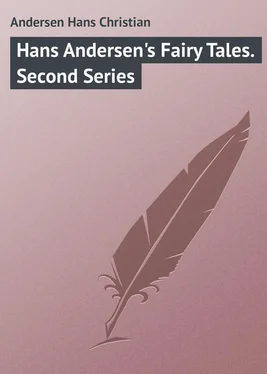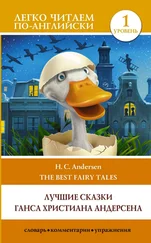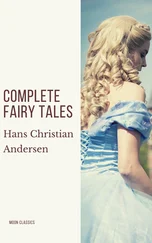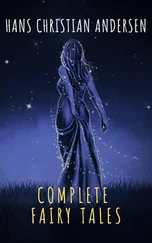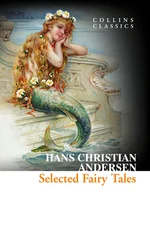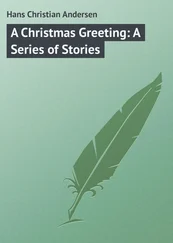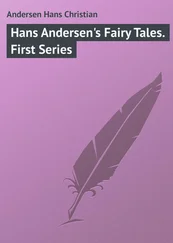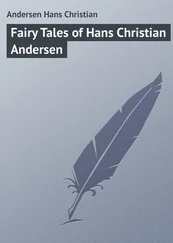Andersen Hans - Hans Andersen's Fairy Tales. Second Series
Здесь есть возможность читать онлайн «Andersen Hans - Hans Andersen's Fairy Tales. Second Series» — ознакомительный отрывок электронной книги совершенно бесплатно, а после прочтения отрывка купить полную версию. В некоторых случаях можно слушать аудио, скачать через торрент в формате fb2 и присутствует краткое содержание. Издательство: Иностранный паблик, Жанр: foreign_prose, на английском языке. Описание произведения, (предисловие) а так же отзывы посетителей доступны на портале библиотеки ЛибКат.
- Название:Hans Andersen's Fairy Tales. Second Series
- Автор:
- Издательство:Иностранный паблик
- Жанр:
- Год:неизвестен
- ISBN:нет данных
- Рейтинг книги:3 / 5. Голосов: 1
-
Избранное:Добавить в избранное
- Отзывы:
-
Ваша оценка:
- 60
- 1
- 2
- 3
- 4
- 5
Hans Andersen's Fairy Tales. Second Series: краткое содержание, описание и аннотация
Предлагаем к чтению аннотацию, описание, краткое содержание или предисловие (зависит от того, что написал сам автор книги «Hans Andersen's Fairy Tales. Second Series»). Если вы не нашли необходимую информацию о книге — напишите в комментариях, мы постараемся отыскать её.
Hans Andersen's Fairy Tales. Second Series — читать онлайн ознакомительный отрывок
Ниже представлен текст книги, разбитый по страницам. Система сохранения места последней прочитанной страницы, позволяет с удобством читать онлайн бесплатно книгу «Hans Andersen's Fairy Tales. Second Series», без необходимости каждый раз заново искать на чём Вы остановились. Поставьте закладку, и сможете в любой момент перейти на страницу, на которой закончили чтение.
Интервал:
Закладка:
They pressed toward her, and doubtless would have destroyed the coats had not, at that moment, eleven wild swans flown over her and alighted on the cart. They flapped their large wings, and the crowd drew back in alarm.
"It is a sign from Heaven that she is innocent," whispered many of them; but they did not venture to say it aloud.
As the executioner seized her by the hand to lift her out of the cart, she hastily threw the eleven coats over the eleven swans, and they immediately became eleven handsome princes; but the youngest had a swan's wing instead of an arm, for she had not been able to finish the last sleeve of the coat.
"Now I may speak," she exclaimed. "I am innocent."
Then the people, who saw what had happened, bowed to her as before a saint; but she sank unconscious in her brothers' arms, overcome with suspense, anguish, and pain.
"Yes, she is innocent," said the eldest brother, and related all that had taken place. While he spoke, there rose in the air a fragrance as from millions of roses. Every piece of fagot in the pile made to burn her had taken root, and threw out branches until the whole appeared like a thick hedge, large and high, covered with roses; while above all bloomed a white, shining flower that glittered like a star. This flower the king plucked, and when he placed it in Eliza's bosom she awoke from her swoon with peace and happiness in her heart. Then all the church bells rang of themselves, and the birds came in great flocks. And a marriage procession, such as no king had ever before seen, returned to the castle.
THE LAST DREAM OF THE OLD OAK
IN THE forest, high up on the steep shore and not far from the open seacoast, stood a very old oak tree. It was just three hundred and sixty-five years old, but that long time was to the tree as the same number of days might be to us. We wake by day and sleep by night, and then we have our dreams. It is different with the tree; it is obliged to keep awake through three seasons of the year and does not get any sleep till winter comes. Winter is its time for rest – its night after the long day of spring, summer, and autumn.
During many a warm summer, the Ephemeras, which are flies that exist for only a day, had fluttered about the old oak, enjoyed life, and felt happy. And if, for a moment, one of the tiny creatures rested on the large, fresh leaves, the tree would always say: "Poor little creature! your whole life consists of but a single day. How very short! It must be quite melancholy."
"Melancholy! what do you mean?" the little creature would always reply. "Why do you say that? Everything around me is so wonderfully bright and warm and beautiful that it makes me joyous."
"But only for one day, and then it is all over."
"Over!" repeated the fly; "what is the meaning of 'all over'? Are you 'all over' too?"
"No, I shall very likely live for thousands of your days, and my day is whole seasons long; indeed, it is so long that you could never reckon it up."
"No? then I don't understand you. You may have thousands of my days, but I have thousands of moments in which I can be merry and happy. Does all the beauty of the world cease when you die?"
"No," replied the tree; "it will certainly last much longer, infinitely longer than I can think of."
"Well, then," said the little fly, "we have the same time to live, only we reckon differently." And the little creature danced and floated in the air, rejoicing in its delicate wings of gauze and velvet, rejoicing in the balmy breezes laden with the fragrance from the clover fields and wild roses, elder blossoms and honeysuckle, and from the garden hedges of wild thyme, primroses, and mint. The perfume of all these was so strong that it almost intoxicated the little fly. The long and beautiful day had been so full of joy and sweet delights, that, when the sun sank, the fly felt tired of all its happiness and enjoyment. Its wings could sustain it no longer, and gently and slowly it glided down to the soft, waving blades of grass, nodded its little head as well as it could, and slept peacefully and sweetly. The fly was dead.
"Poor little Ephemera!" said the oak; "what a short life!" And so on every summer day the dance was repeated, the same questions were asked and the same answers given, and there was the same peaceful falling asleep at sunset. This continued through many generations of Ephemeras, and all of them felt merry and happy.
The oak remained awake through the morning of spring, the noon of summer, and the evening of autumn; its time of rest, its night, drew near – its winter was coming. Here fell a leaf and there fell a leaf. Already the storms were singing: "Good night, good night. We will rock you and lull you. Go to sleep, go to sleep. We will sing you to sleep, and shake you to sleep, and it will do your old twigs good; they will even crackle with pleasure. Sleep sweetly, sleep sweetly, it is your three hundred and sixty-fifth night. You are still very young in the world. Sleep sweetly; the clouds will drop snow upon you, which will be your coverlid, warm and sheltering to your feet. Sweet sleep to you, and pleasant dreams."
And there stood the oak, stripped of all its leaves, left to rest during the whole of a long winter, and to dream many dreams of events that had happened, just as men dream.
The great tree had once been small; indeed, in its cradle it had been an acorn. According to human reckoning, it was now in the fourth century of its existence. It was the largest and best tree in the forest. Its summit towered above all the other trees and could be seen far out at sea, so that it served as a landmark to the sailors. It had no idea how many eyes looked eagerly for it. In its topmost branches the wood pigeon built her nest, and the cuckoo sang his well-known song, the familiar notes echoing among the boughs; and in autumn, when the leaves looked like beaten copper plates, the birds of passage came and rested on the branches before beginning their flight across the sea.
But now that it was winter, the tree stood leafless, so that every one could see how crooked and bent were the branches that sprang forth from the trunk. Crows and rooks came by turns and sat on them, and talked of the hard times that were beginning, and how difficult it was in winter to obtain a living.
It was just at the holy Christmas time that the tree dreamed a dream. The tree had doubtless a feeling that the festive time had arrived, and in its dream fancied it heard the bells of the churches ringing. And yet it seemed to be a beautiful summer's day, mild and warm. The tree's mighty summit was crowned with spreading, fresh green foliage; the sunbeams played among its leaves and branches, and the air was full of fragrance from herb and blossom; painted butterflies chased each other; the summer flies danced around it as if the world had been created merely that they might dance and be merry. All that had happened to the tree during all the years of its life seemed to pass before it as if in a festive pageant.
It saw the knights of olden times and noble ladies ride through the wood on their gallant steeds, with plumes waving in their hats and with falcons on their wrists, while the hunting horn sounded and the dogs barked. It saw hostile warriors, in colored dress and glittering armor, with spear and halberd, pitching their tents and again taking them down; the watchfires blazed, and men sang and slept under the hospitable shelter of the tree. It saw lovers meet in quiet happiness near it in the moonshine, and carve the initials of their names in the grayish-green bark of its trunk.
Once, but long years had passed since then, guitars and Æolian harps had been hung on its boughs by merry travelers; now they seemed to hang there again, and their marvelous notes sounded again. The wood pigeons cooed as if to express the feelings of the tree, and the cuckoo called out to tell it how many summer days it had yet to live.
Читать дальшеИнтервал:
Закладка:
Похожие книги на «Hans Andersen's Fairy Tales. Second Series»
Представляем Вашему вниманию похожие книги на «Hans Andersen's Fairy Tales. Second Series» списком для выбора. Мы отобрали схожую по названию и смыслу литературу в надежде предоставить читателям больше вариантов отыскать новые, интересные, ещё непрочитанные произведения.
Обсуждение, отзывы о книге «Hans Andersen's Fairy Tales. Second Series» и просто собственные мнения читателей. Оставьте ваши комментарии, напишите, что Вы думаете о произведении, его смысле или главных героях. Укажите что конкретно понравилось, а что нет, и почему Вы так считаете.
